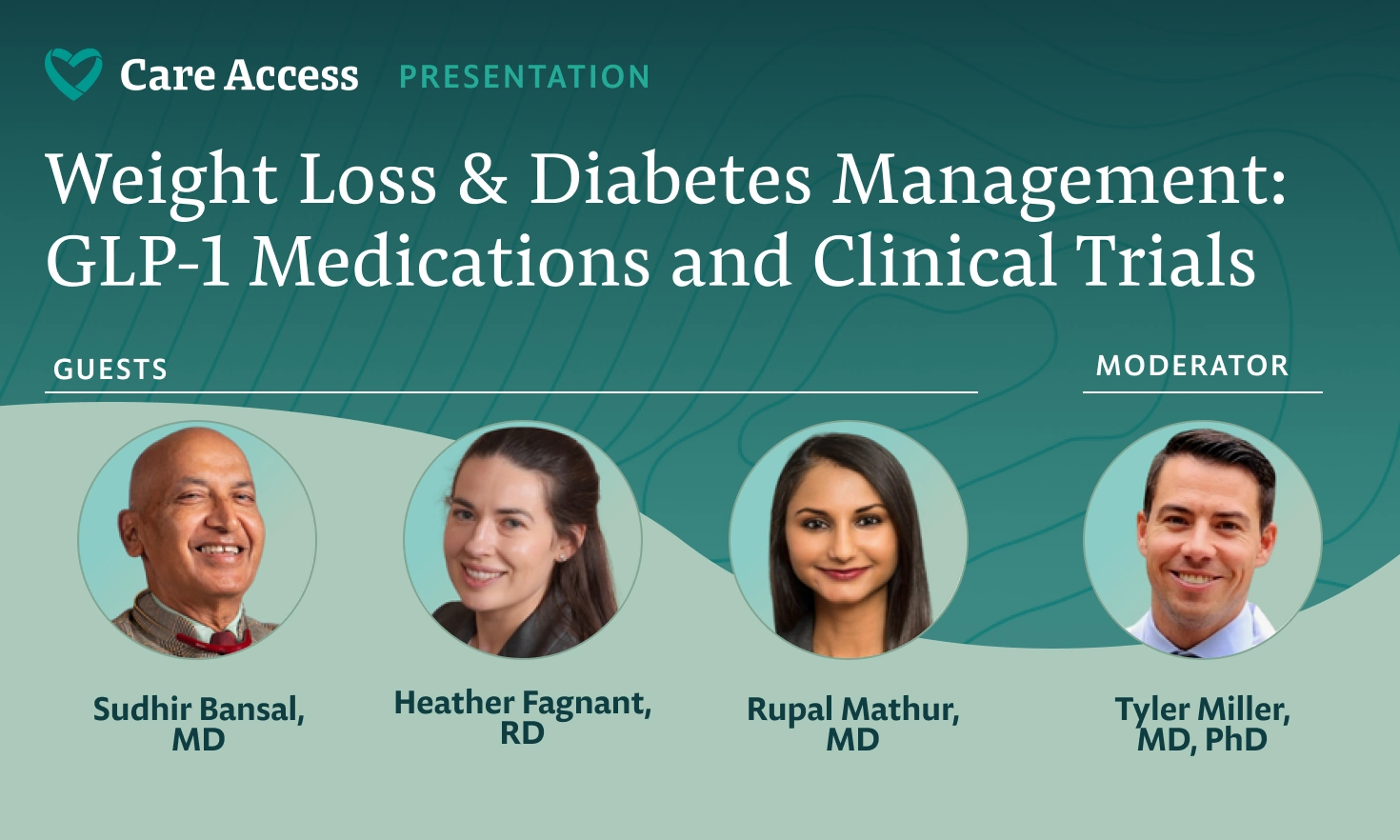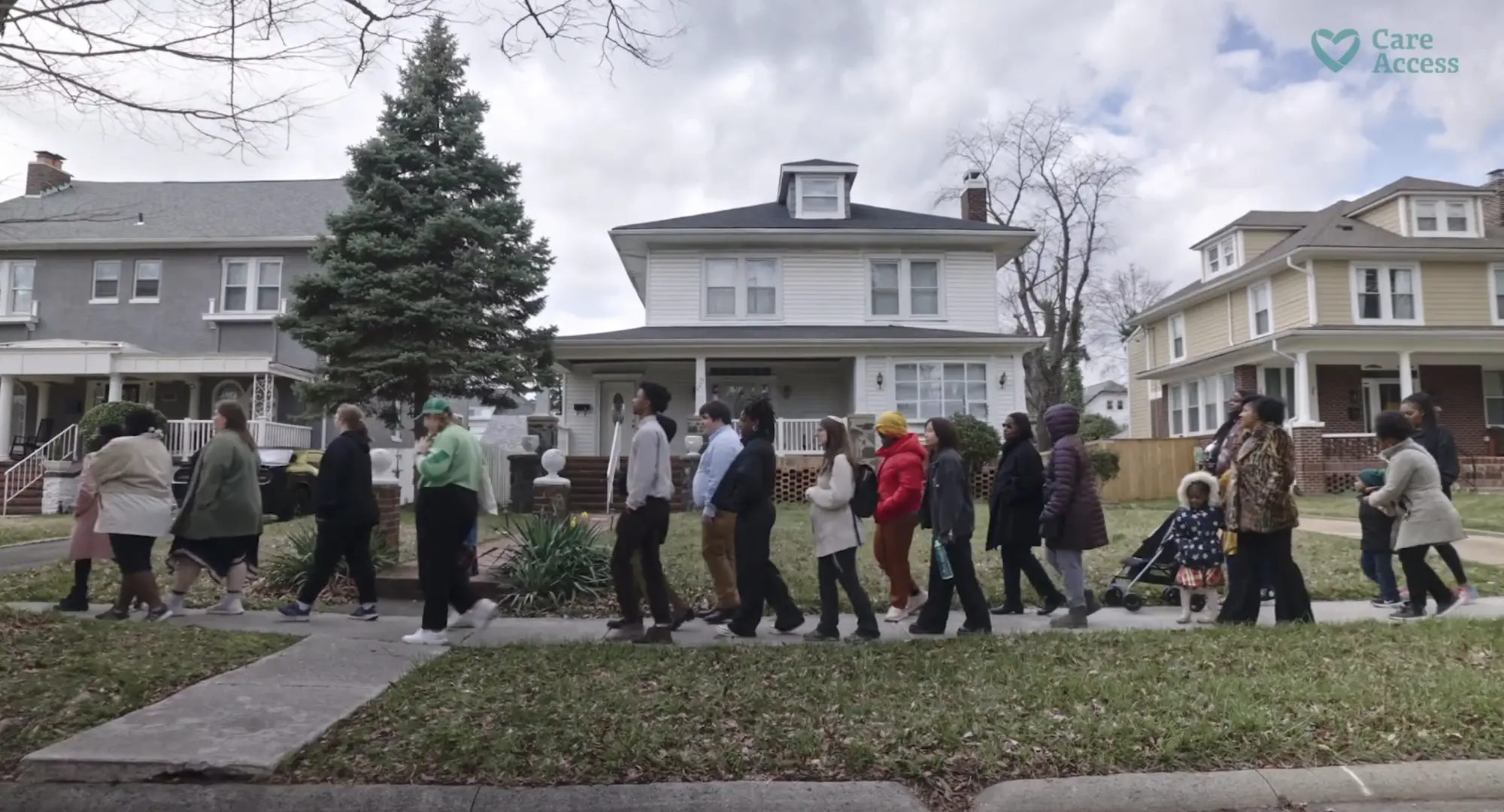Back to Health Resources
Weight Loss & Diabetes Management: GLP-1 Medications and Clinical Trials

Our recent webinar on GLP-1 medications covered tons of information about these revolutionary drugs. What are they? What are the side effects? Why and how are they being researched? Check out the three main themes from our session below.
1 | How GLP-1 Medications Work for Weight Loss and Diabetes Management
Dr. Rupal Mathur is a physician with the Lifelong Weight Loss Clinic. [8:20-11:45]
- GLP-1s and GIPs are two hormones made naturally by your body.
- GLP-1 is made in your gut and helps regulate your blood sugar levels and your appetite. It triggers your body to release insulin, reduces something called glucagon (which raises your blood sugar), slows down digestion, and makes you feel full.
- GIP is made in your small intestine and helps regulate blood sugar and energy. It stimulates your pancreas to release insulin when you eat. It also plays a role in appetite and fat storage.
- GLP-1 and GIP medications mimic these naturally occurring hormones.
Potential benefits of taking GLP-1s and GIPs
- These medications can help those with:
- Type 2 diabetes
- Overweight or obesity
- Heart or metabolic risks
- They help your body:
- Make more insulin when needed
- Lower blood sugar
- Feel fuller faster and stay full longer
- Lose weight (in some cases)
The Different Types of Medications
There are three main types of drugs available and being studied right now:
- Single agonist: GLP-1 only drugs (like Ozempic) mimic only the GLP-1 action in the body.
- Dual agonist: GLP-1 + GIP drugs (like Mounjaro) mimic the actions of both hormones.
- Triple agonist: GLP-1 + GIP + Glucagon drugs are not yet FDA-approved but are being studied for their effectiveness.

Side Effects
[13:10 - 16:35]
Because these drugs act on your gut, many of the side effects are gut-related ailments like nausea, diarrhea, vomiting, or constipation. However many times, these can be avoided by sticking to consistent lifestyle and meal choices. Heather Fagnant, RDN discusses this in more detail around the 19-minute mark of the webinar.
Some have experienced injection site reactions or other less common symptoms like headache, dizziness, fatigue, etc.
There are a few serious risks to look out for, though they are rare.
- Allergic reactions
- Inflammation of the pancreas
- Risk to unborn babies
- Low blood sugar (especially if taken with insulin or other meds)
In general, the drugs are generally very well-tolerated.
2 | Lifestyle Changes that are Recommended While Taking These Medications
Heather Fagnant, RDN [18:20 - 22:25]
Diet
It’s important to eat healthy to manage side effects like nausea, vomiting, diarrhea, and constipation. Eat a diet rich in veggies, fruits, lean protein, and whole grains.
Hydration
GLP-1s work to stunt your appetite, which includes thirst. If you’re dehydrated, you may experience gut-related side effects or things like fatigue and headache.
Protein
Muscle mass loss is also a concern while on these medications. To reduce loss of muscle mass, increasing your protein intake is important.
Stabilize blood sugars
Avoid spikes by choosing slow-digesting, high fiber carbs.
Physical activity
Continue to be active to support strength building and weight loss.
Stress management
Monitoring your stress can help with food cravings and maintaining healthy behaviors.
Sleep
Getting enough quality sleep also supports healthy metabolism and energy levels.
Mental and emotional health
Weight stigma can be a huge issue when it comes to your weight loss journey. It’s important you have tools to deal with the emotional and mental health aspects of weight loss.
3 | Past, Present, and Future Research on GLP-1 Medications
Dr. Sudhir Bansal, PI and endocrinologist [24:00 - 30:45]
Past:
- The first clinical trials were for those with diabetes.
- Then a weight loss benefit was discovered.
- Other health benefits have been discovered along the way:
- 14% lower risk of serious heart problems
- 12% lower risk of death from any cause
- 14% lower risk of being hospitalized for heart failure
- 17% lower risk of serious kidney problems
Present:
- Studying how effective we can get the drugs through dosing changes
- Looking into the long-term benefits or risks associated with multi-year use
Future:
- More studying of triple agonist medications
- Pills vs. injections - are they as effective?
Clinical Trials and You
What can you expect if you’re in a clinical trial? [30:50]
- You’ll receive a Health Screening
- There will be no cost to you
- You’ll receive medical support every step of the way
- There are different types of trials, different study lengths, and you can stop at any time.
Throughout the session, attendees submitted questions to be answered by our experts:
[32:45]
What happens when you go off of the medication?
These drugs have been studied and prescribed for a few years. We know that 85% of people will regain half or ⅔ of weight they lost when they go off of the drugs. The small percentage of people who are able to keep the weight off are often those who learn and sustain better lifestyle changes. If how they shop and eat change while they’re on GLP-1s and they continue this behavior after they’re off, they’ll likely maintain some or all of their weight loss. For those who make healthy choices but still struggle with weight, coming off the medication will often mean regaining that weight. We’re still studying long-term use and discontinuation to learn how to manage this better.
Will you become insulin-dependent?
No.
Is it dangerous to cause the stomach to empty later than normal?
Some side effects might happen and can be avoided with medication and lifestyle management.
In a clinical trial, who gets the placebo?
This is not determined by Care Access. It’s determined randomly by the federal authorities who monitor clinical studies. The doctors and the patients both don’t know who is on the real drug or the placebo. This is called a double-blind study.
Do you get paid to be in a clinical trial?
Study participants are paid for their time, travel, or any other inconvenience. They are not paid an amount that would be an incentive to participate. Compensation is just reimbursement. Participation should be because you’re interested in helping medicine move forward.
Can glp-1 meds be combined with metformin?
Yes, they can be used with proper clinical supervision.
Are these meds okay for those with PCOS?
Yes, in fact we see an enormous weight-loss benefit for those taking the medications.
Explore More Health Resources

STORIES from the Heart

